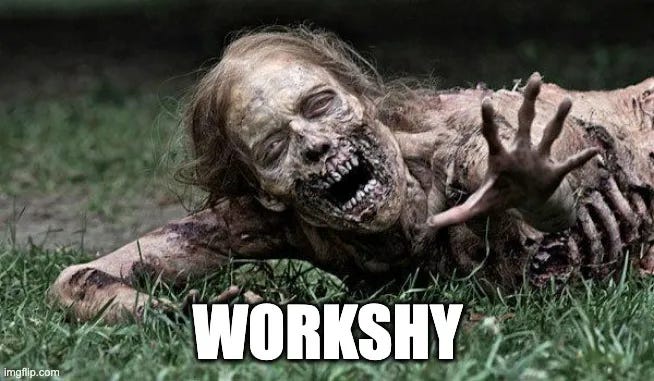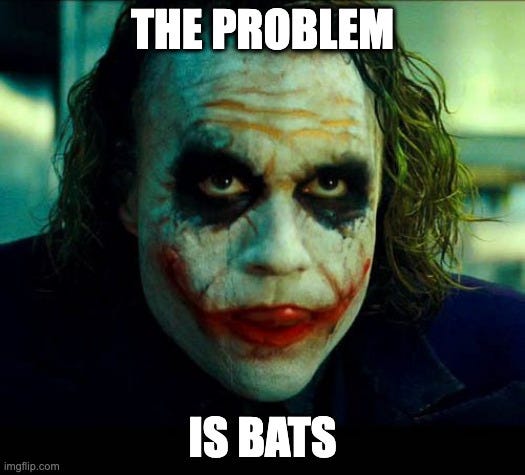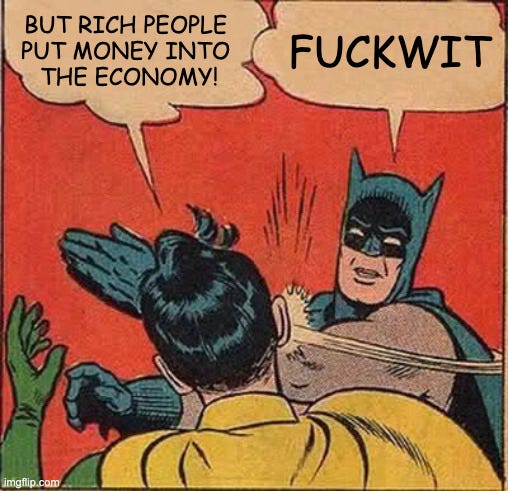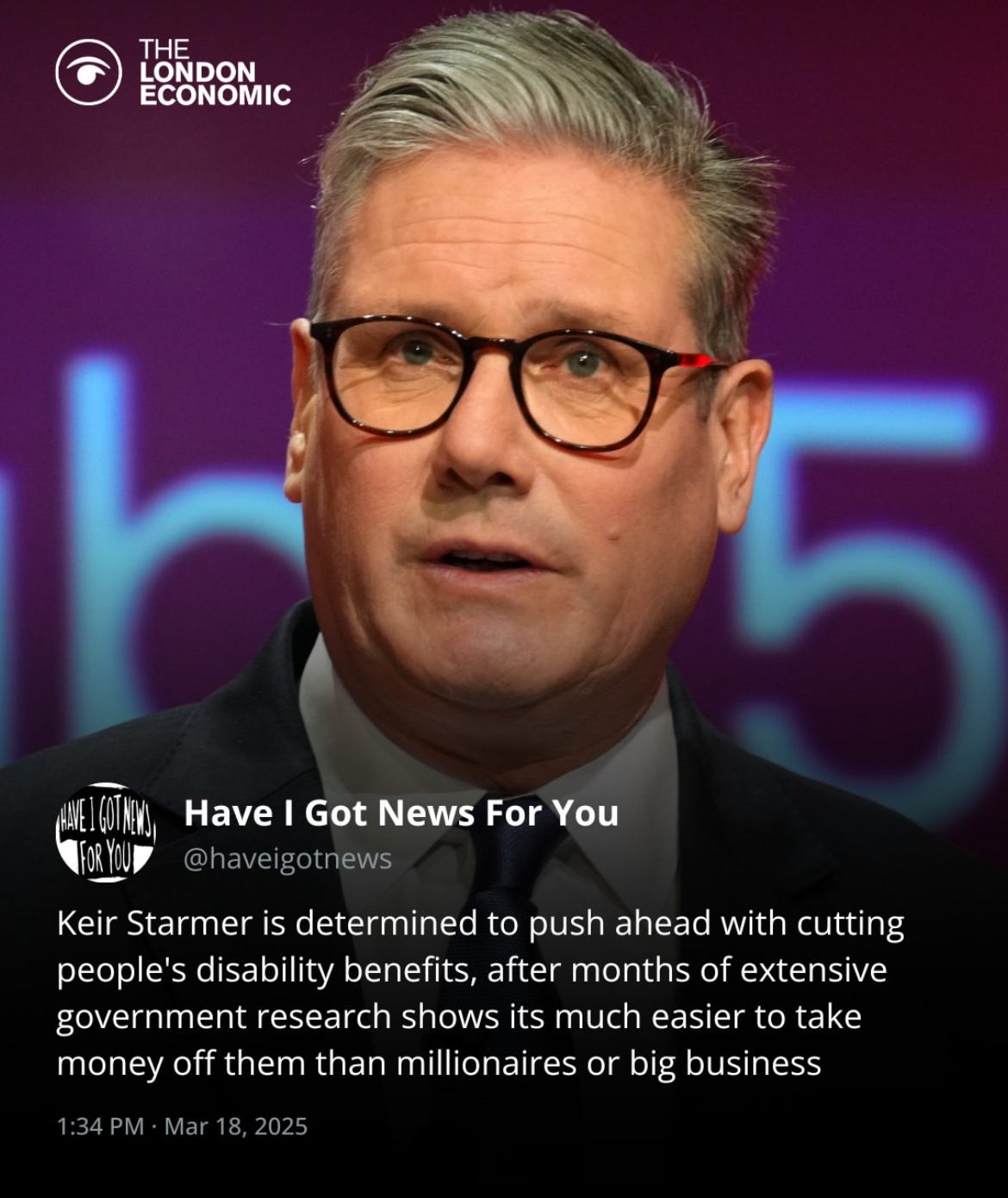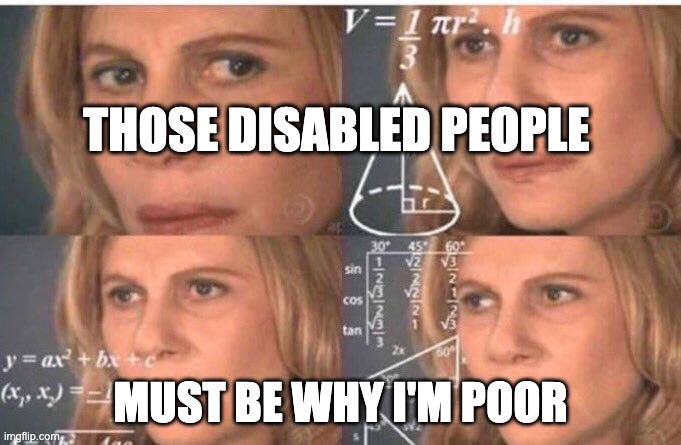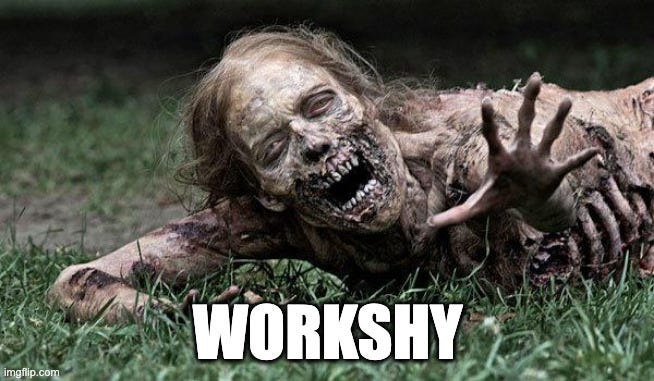Austerity Again (Part One): Who are the workshy scroungers?
Every round of austerity looks for victims. The focus on disability has a long, vicious history of helping to turn welfare into wealth-fare. Part two on Friday.
This week’s blog was too long to fit into one instalment, so it’s split between today (Tuesday) and Friday. It’s also important to stay current when things are moving very fast. I’ll do my best….
So, on Wednesday we will see Rachel Reeves’ Spring budget update. We are all braced for horrors, and the trailing drip feed of cruelties-to-come has been incessant now for weeks. It doesn’t look good, with massive cuts to welfare focused on those out of work and with disabilities, and other cuts to departmental budgets when most sensible economists agree that this will further damage and already buggered economy. Make no mistake, the problem was created by the Tories through 15 years of austerity.
Of course, Labour have continued this, and seem about to increase it. How do we keep ending up with more and more austerity, despite the very obvious fact that it further destroys our economy?
On Friday we are looking at that in more detail. But today, we are looking at the explicitly chosen victims of austerity, and the long history of targets of this type.
The key question we consider is: who are the workshy scroungers in our society?
I can give you a clue: it’s not who the Daily Mail pretends.
A drain on society: the workshy scroungers
Isn’t it funny how much we like to talk about how much people cost? Poor people. Disabled people. Sick people. Children with special educational needs. Overweight people. Bats. (Definitely a new one.)
Wouldn’t it be nice if every now and then we thought about how much rich people cost? But no, we cannot even begin to question that.
The point is that in our political narratives, the poor are always a cost. They suck up resources. They are a drain on society. But the wealthy are always assets. It’s not even just that they own the assets - we talk about them as if they themselves were the asset. And isn’t that confusion quite a helpful one?
The top 1% of people in the UK own £2.8 trillion of assets. That compares to the £2.4 trillion owned by the bottom 70%, or the £1.65 trillion owned by the bottom 50%. Those assets of the wealthy are not money being spent, or resources being invested in productive stuff that benefits all of us. They have been taken from you. The rich sit on their fat assets and generate their own income by leasing or renting those assets back to you. They made that money through extracting rents, profits on your labour (paying you less than your work is worth), or simply gambling on the stock market. Or they just wait for them to appreciate, not least through sky-high interest rates. That income is then taxed at considerably lower rates than working people pay.
Every penny the wealthy hoard is money that is taken OUT of the economy, and with that, it is no longer money used to pay people, invest in real things, to circulate and spread wealth and prosperity. The wealthy are the greatest ‘cost’ to our society. So if you want to know who is lazy and not working - look no further.
But seeking out barriers to prosperity is NOT the goal of austerity. The goal of austerity is to cement and restate the power and privilege of the wealthy. Austerity never affects the rich. As we will see on Friday, there are good reasons to think is not a mistake, or a misunderstanding: it’s the very purpose: to redistribute wealth to the top.
Marked for abandonment
Austerity has to find victims. Most often, we turn to the workless or workshy - we look for people to stigmatise as economically unproductive, and focus on them. Otherwise, people might twig who is really the drain on society. It is a magnificent switcheroo.
Disabled people and people who are sick or otherwise incapacitated are always first in line. That way, we are not only reducing the ‘tax burden’ but also finding someone else to blame. They’re helpful, not just for the reality of their needs, but also for what they represent to us all: broken bodies, things to be left aside, abandoned. Perhaps even eugenically erased.
This is not exactly a new one, and many read this blog will often hear talk about this as a Victorian problem, or perhaps relating to the Elizabethan Poor laws. But the model of the deserving/ undeserving poor has a legacy of almost a millennium. Another great book I read recently is Health Communism, by Beatrice Adler-Bolton and Artie Vierkant, who dig deep into how capitalism likes to identify and define ‘surplus’ discarded and unwanted bodies/ people, who are then viewed as waste. They are then ‘marked for abandonment’, and are used as a reason to avoid reforms that could destabilise capitalism. They also have to be certified - they call this ‘biocertfication’. So when you go for your ATOS or SERCO assessment of just how ‘disabled’ you are, you’re asking for a certification that means you truly are what you say you are. It’s a certificate of ‘deserving’ - but also of surplus, obsolescence, and potential abandonment.
They trace this back to the Statute of Labourers of 1351, which was set up after the Black Death killed a third of workers across Europe, to compel all able-bodied people to work for landowners, and to criminalise those who did not. ‘Cripples’, business owners, and those over 60 were excluded. Ever since, the methods the state uses to delineate who is ‘surplus’ and how, has been critical to maintaining power. Those people were then seen as a drain or burden on society, with ‘biocertification’ as the mechanism to stop fraudsters, malingerers and fakers. Then, as the authors have it, the surplus “vagrants, cripples, paupers, and beggars were pathologized as morally and biologically spoiled, lacking the will to fulfill their potential as upstanding citizens.”1
But worse, idleness, had to be seen as an ‘illness and a social plague’, and potentially catching. After all, if people work out a way not to work for a master, they will no doubt choose it. The more people choose to refuse work, the more others will realise this is a possibility. After the Black Death, the reduced workfroce meant that workers started to get dangerous ideas about raising their wages and choosing which lord they might be employed by. All the more reason, then, that permission for non-work had to be guarded, behind a need to be diagnosed and certified. That way, the pollution of freedom could be contained.2
Alongside that, in line with Clara Mattei’s arguments (as well see on Friday), austerity and cuts to support for the disabled and sick are a great way to make everybody scared, vulnerable, and willing to do things they would not consider in a fairer system. Cutting disability and unemployment payments removes the safety net for all of us, and ensures that we are easier to exploit in crap jobs for crap pay.
The (shitty) nitty-gritty
And so what of the practicalities of Reeves’ and Kendall’s welfare cuts? Well, we don’t know exactly what will be in there yet. But from what I have seen…..
It’s a drop in the ocean, focused on the people who need the money most
To save £5bn, this seems like a pretty shit thing to do. Let’s remember that this is 0.5% of government spending (1/200th) and the bit that focuses on the people with among the shittest lives in our society. Put that way, this does seem a bit of a dick move doesn’t it? Let’s say your weekly food budget is £100. This would be saving 50p. You’d barely get the Tesco voucher out of your wallet for that saving.
Raising the bar just leaves more people to abandonment and slow death - it does not increase equity, or ‘value’
The specifics on eligibility - the particularities of what will and will not be considered sufficient disability - sound horrific. And the actual size of the cuts for many, even where the changes are logical and more defensible, will be catastrophic. Further biocertification brings all kinds of problems - but refusing support for levels of disability previously covered is perverse and dangerous.
Reform is vital
The point is, some of the ideas here are not terrible. The right to try is a good one, as is a lack of ongoing assessments for people with permanent disabilities that do not change. And some of the overall changes are needed in some form, over time. But not with fast cuts. And not without effort to shift the problems that are likely to be leading to the issues - post-Covid (and probably late-capitalism induced) mental ill-health seeming to be at the top of the list, and yet, with no new resources identified. Most of us would not claim that the benefits system is anything but utterly screwed. And that currently, the most vulnerable are disadvantaged, while indeed, the system is much abused.
Like anyone who works around the welfare benefits system, I hear about the sheer horrors of denials and tribunals for people who are incredibly disabled, sick, and struggling through miserable lives in poverty that only worsens. And I also know that some of those most willing to play the system go to the top of the heap. But the answer to a percentage of fraud or overclaiming is not raising the bar for what is considered a genuine need.
Meanwhile, if we want to look at waste, David Graeber’s Bullshit Jobs (as I always say, people think this is a stocking filler humour book - far from it, it’s a serious philosophical/ critical work) has a whole pivotal chapter on the sheer waste of welfare benefits systems. In particular, he outlines the vast sums spent by Government on trying to stop people getting the support to which they are entitled, while at the same time paying other departments and organisations to support people to navigate those very systems.3
Universal credit as an idea - and a goal - was not necessarily a bad one, if it had ever been implemented in a way that actually worked. In fact, universal credit- type payments work well in other countries, and the idea that you have a payment that brings everybody up to a minium standard income without a stigmatising category is not a bad one (and some suggest it is fairer than UBI). But its implementation has been appalling. And the standard to which it ‘raises’ people, sadly, is not high enough. If a minimum basic income isn’t enough to live on, it’s not really the minimum. The delays to receiving it starve people. It acts as a disincentive to trying work that could make an immensely positive difference to people’s lives.
Cutting first cannot work
Taking the money away from the most vulnerable, rather than looking at the system itself, is a fundamental problem. You do not fix a system simply by cutting its budget. Would you fix your car by putting less petrol in it? It’s a nonsensical idea. We have to stop using cuts to drive reform. We need use reform to improve value - and if that therefore reduces costs, all the better. But otherwise, this is literally just the institutionalised ‘abandonment’ we discussed above.
There are a thousand other ways you could find the money
People with disabilities - especially if they are poor, as is always more likely - are seen as having considerably lower social status, and their needs and voices are silenced. Unemployed people are easily demonised as workshy, and their isolation from the economy also isolates them from influence. None of these people write or control the media, or lobby parliament, or make donations to political parties, or make the kind of financial decisions that could overthrow a Government. So it’s a lot easier to hit them where it hurts than the rich. That’s what bullying is.
And it’s blindingly obvious that other taxes could make up the difference five times over. As Tax Justice UK, and many, many others have pointed out, a wealth tax of 2% over £10m would bring in an additional £20bn+ a year. That threshold is far far far more than high enough to avoid those who just happened to end up with a house in London while it was affordable.4 There might be other consequences, good and bad (some of the worst scumbags would leave the country - good). But they would not just focus on a few people who can’t wash their lower bodies without assistance.
What a wealth tax would do, however, is hit those who are truly economically unproductive - the real workshy scroungers.
Disabled people - a class of ‘surplus’ persons - are marked for abandonment, and used to draw attention from those in society who are truly unproductive. More tests, lower eligibilities, and targeting for supposed fraud, are all part of a long history of stigmatisation and immiseration.
And their symbolic value is far more important to politics than any financial savings.
Knowing this, revealing it, and calling it out over and over again is important. Because what it reminds us all is that something is happening here that has very little to do with prosperity or economic ‘reality’.
Coming on Friday…
It’s not just about welfare and disability. In fact, it is very helpful for the powerful to have us think that.
But this is part of a much bigger battle over political economy - how you make decisions about managing the money of a state (and world), based on our core beliefs.
We look at the battles over theory and practice, and the growing disjoint between actual learned academic economists and policy think tanks and gurus.
And we ask: why and HOW do we keep ending up with austerity over and over and over again?
See you then…. If you’re still up for it…
And finally…
This is so accurate. I met Socialist Workers at a societies fair in Edinburgh in 1994 and I practically turned Tory. A nod of hello and after ten minutes they had made me feel ashamed, stupid, and poor (they shamed me into a donation of my food money for two days for some stupid campaign). The ‘progressive’ left does an amazing job of putting everybody off what should be a fairly easy sell…. I cannot be doing with purity culture.
Fortunately, I am a DELIGHT.
Barely Civil Society is trying to create deeper debate in the UK charity sector.
Here are three ways to help.
1. Subscribe
2. Share
Or….
Health Communism: p46.
Hmmmm. So after a pandemic, when the workforce is reduced, you say….. Perhaps also if one kicked out a massive part of our workforce by leaving a large trrading block…? I’ll just leave this here.
In another blog I’m going to cover employability, and particularly look at why we always claim the issue is individuals and not employers… No time this week.
£10m is massive. I mean even a cut off of £2-3m would mean you don’t hit people who, for example, bought their home in London when it was affordable. However, let’s say you did start at £2-3m, you will start getting a very large proportion of people who work in the city, people who have more than one ‘home’, People who own farms, and so on. Whatever you think of that (I couldn’t GAF), it will cause an awful lot more people who consider themselves ‘comfortable’ or middle class to turn on Labour. It’s dangerously close to Waitrose and landrover territory. And they’re still salty about private schools.

